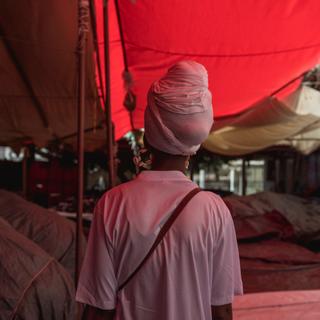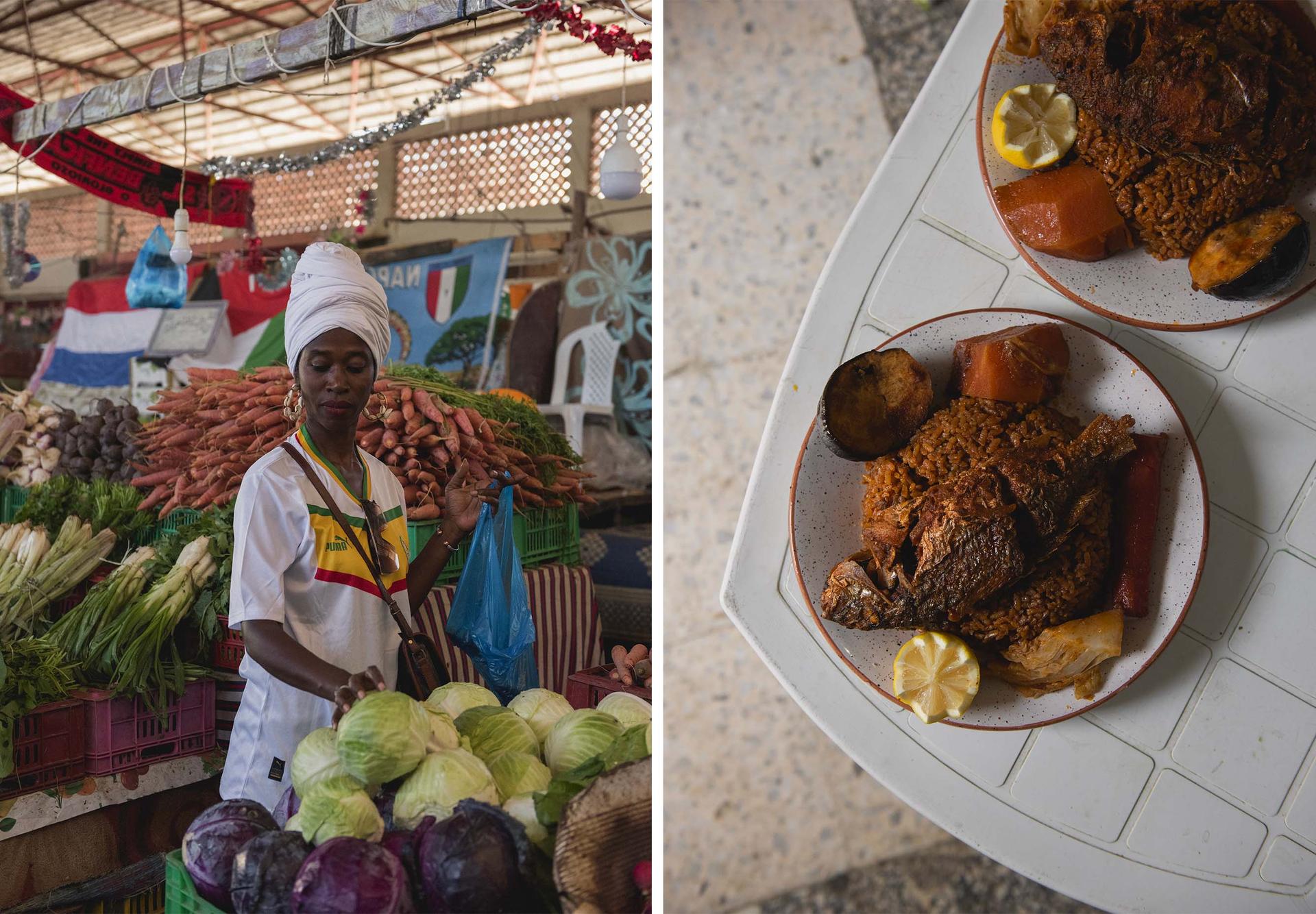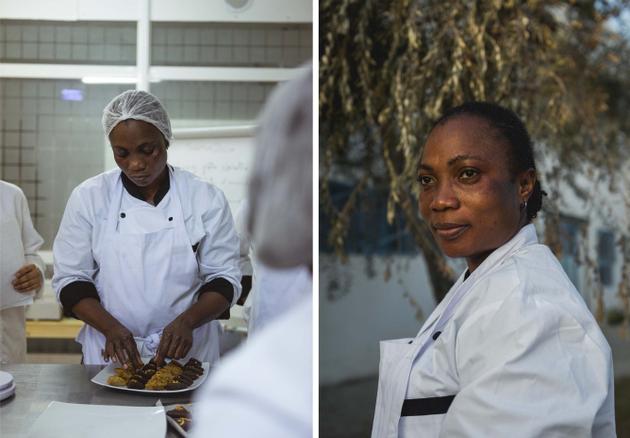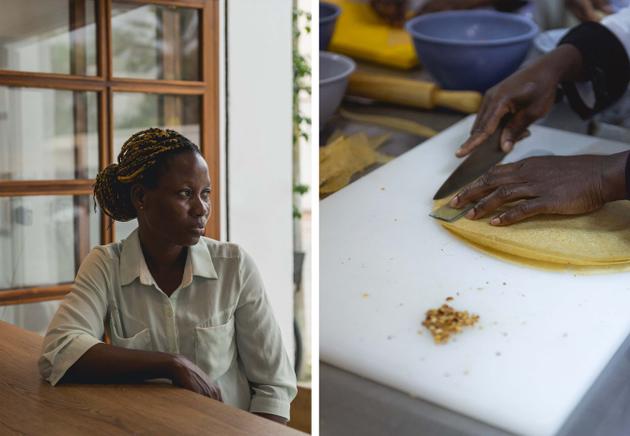


Inside the kitchens of migrant women in Tunisia
FeatureLéna, Nathalie, Rebecca and Marcelle fight every day to create new prospects for themselves, despite the hardships, the Covid crisis, inflation and waves of racist violence. They are caught between the desire to stay in Tunis and homesickness.
The oil began to bubble. Léna Pouye grabbed four good looking sea bream from the kitchen table and threw them one by one into the pan. The sound of sizzling filled the room. Lying in wait on the doorstep overlooking the street, a ginger cat meowed in disappointment at seeing its prey disappear. Pouye shooed him away with her foot and the little feline immediately returned to his life in the gutters on this warm October afternoon. Two months had passed since 47-year-old Pouye moved with her daughter, 11-year-old Yasmine, to a small apartment in Cité Ettahrir, a working-class district in the west of Tunis. In the room where they live and sleep, divided in two by a partition, everything served as a reminder of her native Senegal: The jersey of the national football team (the Lions of Teranga), the boubou robes, the dried hibiscus flowers, and even the thieb she was preparing, "the favorite dish of the Senegalese!" she announced proudly.
These little details enable her to keep alive the connection with the country she left 13 years ago to settle in Tunisia and to pass on a little of her cultural heritage to her daughter. They also carry a sense of nostalgia. "I think about Senegal every day," she said wistfully. Before becoming the primary gateway to Europe for migrants, Tunisia had long been a welcoming land for many women from West Africa, lured by the prospect of higher wages than in their home countries. This particular type of immigration was also facilitated by numerous human trafficking networks. But the worsening socio-economic crisis, the rise in racist violence and tensions over the migration issue have all taken their toll on this economic appeal, driving many of them to leave. Those who have stayed are also considering it. "You shouldn't deny your fate, but even so, I'd like to go somewhere else," said Pouye.
'A country of mahbouls'
Despite this urge to leave, the Senegalese woman has spent many years in Tunisia. When she moved there to work as a private chef, she remembered much more hospitable conditions. "During Ben Ali's time, it wasn't like this. I was comfortable, people respected each other and life was cheaper," she said, somewhat nostalgic for the old regime. She then lived through the 2011 revolution, giving birth to Yasmine two years after her arrival. After her divorce, followed by her ex-husband's return to Senegal, Pouye found herself raising her child alone. "He left me to handle it all," she said. "I was the one who did everything for my daughter. It wasn't easy, but I had to take on my responsibilities."

As a single migrant woman struggling against social injunctions, Pouye has faced many challenges: Educating Yasmine, providing for both of them, navigating the bureaucracy, dealing with the scrutiny and comments of Tunisian society, and holding down several jobs. Her determination, coupled with a strong character, enabled her to overcome it all. "This is a country of 'mahboul' [madmen, in Tunisian Arabic]. So I have to be even more mahboul," she laughed.
The Covid pandemic was the last straw. Due to the lockdown, she lost her job, found herself without income and soon without a roof over her head. "I slept with my daughter in the street because the landlord kicked us out. She cried herself sick," she said, her voice filled with pain. Since then, nothing has been the same. Pouye has experienced employment and housing insecurity, moving from apartment to apartment to keep pace with the ever-increasing rents, going through periods without work, and having to deal with the uncertainties of the local economy. "Before, I used to cook at home, and people would order dishes for 10 or 15 people. But with the shortages, the lack of rice and sugar, how do you expect me to work? What's more, prices have gone up because of inflation, but customers don't want to pay more."
'Hordes of illegal migrants'
Even back then, she was already thinking about returning to Senegal. But, with a child to support, she tried to bounce back and turned to apprenticeships, convinced that a qualification could open the door to stable employment. She enrolled in a cooking and pastry-making course run by the Ftartchi? organization for migrant women. The course aims to promote "integration in the workplace," explained 29-year-old Yosra Lachheb, an award-winning professional pastry chef and instructor. "Women work more than men in the pastry business. It's easier for them to get a job in this sector than in others."

A number of former students were able to find regular work after completing their training. However, today, the vast majority of them are no longer in Tunisia. "Most of the former beneficiaries are now in Europe or back home," said Aida, the organization's director, explaining that they were prompted to leave by the wave of racism unleashed on February 21 by President Kais Saied's speech against the "hordes of illegal migrants."
Despite this, the training courses continue. At the organization's premises, located in the northern suburbs of the capital, a new group gathered around the work surface. "We let the butter melt until the whey separates from the fat," said 34-year-old Rebecca Dyali, diligently. "This is what we call clarifying the butter," added Lachheb, in a teacherly manner. In this large stainless steel kitchen, the notion of integration has given way to aspirations for somewhere else. "I want to go to Europe," said Dyali. "Well, not necessarily in Europe, but to another country. In any case, I need to know how to do something, and pastry is widely consumed everywhere."
'I will be a strong woman'
After working in Tunisia for almost three years, she no longer sees herself staying. She blames the insecurity and attacks, the challenges of finding employment and accommodation, and the lack of prospects for the future. Her compatriot, Marcelle Nyabri, who arrived four years ago, shares the same sentiment but is already planning her return. "If I go back to Côte d'Ivoire, this training will enable me to work independently, to mix our traditional pastry-making traditions with those of Tunisia. It will bring about change," she said, excited at the prospect of one day owning her own store.


Even Nathalie Diby, one of the standout students from the previous "class," who has now found a job as a cook, was contemplating the future. "Before I found a job, it was very difficult. Now I feel good here. I'd like to stay in Tunisia, if the pay increases and if I make progress," she said, hopeful but realistic. "The situation has calmed down since February, but who knows how it will develop?" "One day, we'll all go back," said Dyali.
Diby, Dyali and Nyabri are resilient, but most of their friends and acquaintances have already left the country. As for Pouye, she keeps putting off her return for fear of disrupting her daughter. "How is she going to keep her friends?" she said. She didn't respond to the repatriation planes that Senegal sent in February after the waves of violence. She considered the departure too hasty after so many years. Nor is she tempted to set sail, which has never been an option for her. She is waiting for the right moment. "When I return to Senegal, I won't be bringing back wealth but life experience," she said. "I'll be a strong woman, having served in the army here in Tunisia."
